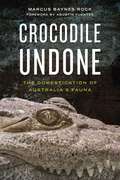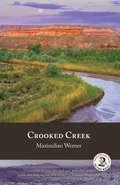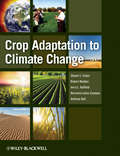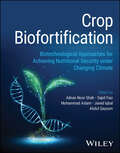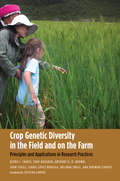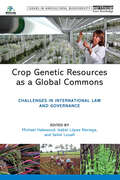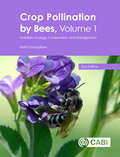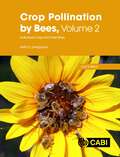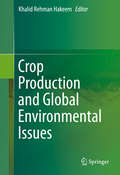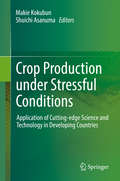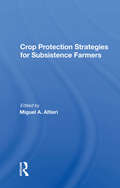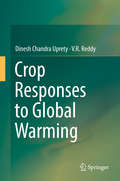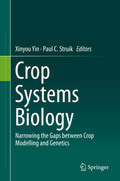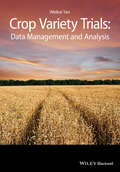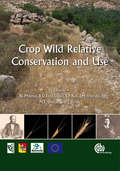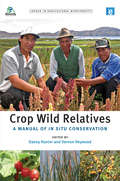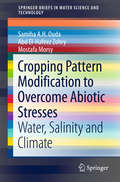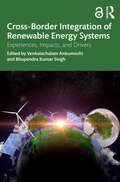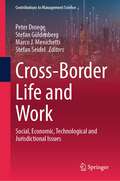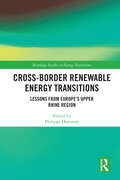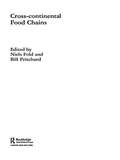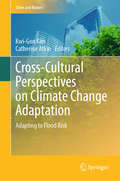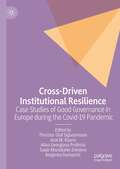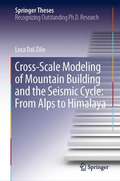- Table View
- List View
Crocodile Undone: The Domestication of Australia’s Fauna (Animalibus)
by Marcus Baynes-RockAcross the world, animals are being domesticated at an unprecedented rate and scale. But what exactly is domestication, and what does it tell us about ourselves? In this book, Marcus Baynes-Rock seeks the common thread linking stories about the domestication of Australia's native animals, arguing that domestication is part of a process by which late modernity threatens to undo the world.In a deeply personal account, the author tells of his encounters with crocodiles and emus behind fences, dingoes and kangaroos crossing boundaries, and native bees producing honey in his suburban backyard. Drawing on comparisons between Aboriginal and colonial Australians, Baynes-Rock reveals how the domestication of Australia’s fauna is a process of “unmaking.” As an extension of late modernity, the connections that tie humans and other animals to wider ecologies are being severed, threatening to isolate us and our domesticates from the rest of the world. It is here that Baynes-Rock reveals a key difference between Aboriginal and colonial Australian modes of landscape management: while one is focused on a systemic approach and sees humans as integral to ecological integrity, the other seeks to sever domesticates from ecological processes. The question that emerges is: How might we reconfigure and maintain these connections without undoing humanity?Written in the author’s characteristically frank, passionate, and humorous style, Crocodile Undone takes the reader on a journey across both physical and philosophical landscapes. This fascinating narrative will appeal to anyone interested in the vital connections between humans and animals.
Crocodile Undone: The Domestication of Australia’s Fauna (Animalibus: Of Animals and Cultures #15)
by Marcus Baynes-RockAcross the world, animals are being domesticated at an unprecedented rate and scale. But what exactly is domestication, and what does it tell us about ourselves? In this book, Marcus Baynes-Rock seeks the common thread linking stories about the domestication of Australia's native animals, arguing that domestication is part of a process by which late modernity threatens to undo the world.In a deeply personal account, the author tells of his encounters with crocodiles and emus behind fences, dingoes and kangaroos crossing boundaries, and native bees producing honey in his suburban backyard. Drawing on comparisons between Aboriginal and colonial Australians, Baynes-Rock reveals how the domestication of Australia’s fauna is a process of "unmaking." As an extension of late modernity, the connections that tie humans and other animals to wider ecologies are being severed, threatening to isolate us and our domesticates from the rest of the world. It is here that Baynes-Rock reveals a key difference between Aboriginal and colonial Australian modes of landscape management: while one is focused on a systemic approach and sees humans as integral to ecological integrity, the other seeks to sever domesticates from ecological processes. The question that emerges is: How might we reconfigure and maintain these connections without undoing humanity?Written in the author’s characteristically frank, passionate, and humorous style, Crocodile Undone takes the reader on a journey across both physical and philosophical landscapes. This fascinating narrative will appeal to anyone interested in the vital connections between humans and animals.
Crooked Creek
by Maximilian Werner2012 Eric Hoffer Book Awards for General Fiction Honorable Mention2011 Utah Book Award FinalistCrooked Creek takes place during the latter part of westward expansion and chronicles the lives (and deaths) of the Wood family. The Woods-Preston and Sara-must flee Arizona when they, along with Sara's parents and little brother Jasper, unwittingly get caught up in the plunder and sale of American Indian corpses and funerary objects. Preston, Sara, and Jasper end up in the Heber Valley of Utah, where they seek the support of Sara's Uncle Neff until they can be reunited with Sara's mother and father. But from the moment they ride into Heber, Preston and Sara learn that life in the valley is not as it appears, and that no matter how far we run, we cannot escape the past. Maximilian Werner is the author of Black River Dreams, a collection of literary fly fishing essays that won the 2008 Utah Arts Council's Original Writing Competition for Nonfiction: Book. Mr. Werner's poems, fiction, creative nonfiction, and essays have appeared in several journals and magazines, including Matter Journal: Edward Abbey Edition, Bright Lights Film Journal, The North American Review, ISLE, Weber Studies, Fly Rod and Reel, and Columbia. He lives in Salt Lake City with his wife and two children and teaches writing at the University of Utah."Maximilian Werner is a fresh and grounded writer, a welcome and original new voice." -Thomas McGuane, author of Driving on the Rim"Here in the deep measured prose of Max Werner is a western story, harsh and lush as the old world it depicts. Crooked Creek shows again that one of the natural laws of the wilderness--along with wind and stone and animals and family--is violence. Just as wind and water shaped the stone, trouble shaped these men. With its compelling, layered story, this rich book is a reader's pleasure." -Ron Carlson, author of The Signal"Max Werner's Crooked Creek offers a haunting voyage into the past and into living landscapes sharpened by western light, resonating with the work of such authors as Cormac McCarthy and Wallace Stegner. A narrative of the vitality of family bonds, it is also a tale of the heroic struggle to carry the burden of memory and to transform history's nightmares into visions of possibility, as Octavio Paz once argued was the high calling of literature. Crooked Creek reminds us of the tough aesthetic that is required to sustain hope in family, in community, and in the staggering and heartbreaking beauty of nature that Werner's prose powerfully illuminates, while also reckoning with the dark sins of betrayal and violence that are the legacies of the American West. Werner convinces us that no meaningful sense of place is possible otherwise."-George Handley, author of Home Waters: A Year of Recompenses on the Provo River
Crop Adaptation to Climate Change
by Shyam Singh Yadav Anthony J. Hall Jerry L. Hatfield Hermann Lotze-Campen Robert J. ReddenA major task of our time is to ensure adequate food supplies for the world's current population (now nearing 7 billion) in a sustainable way while protecting the vital functions and biological diversity of the global environment. The task of providing for a growing population is likely to be even more difficult in view of actual and potential changes in climatic conditions due to global warming, and as the population continues to grow. Current projections suggest that the world's temperatures will rise 1.8-4.0 by 2100 and population may reach 8 billion by the year 2025 and some 9 billion by mid-century, after which it may stabilize. This book addresses these critical issues by presenting the science needed not only to understand climate change effects on crops but also to adapt current agricultural systems, particularly in regard to genetics, to the changing conditions. Crop Adaptation to Climate Change covers a spectrum of issues related to both crops and climatic conditions. The first two sections provide a foundation on the factors involved in climate stress, assessing current climate change by region and covering crop physiological responses to these changes. The third and final section contains chapters focused on specific crops and the current research to improve their genetic adaptation to climate change. Written by an international team of authors, Crop Adaptation to Climate Change is a timely look at the potentially serious consequences of climate change for our global food supply, and is an essential resource for academics, researchers and professionals in the fields of crop science, agronomy, plant physiology and molecular biology; crop consultants and breeders; as well as climate and food scientists.
Crop Biofortification: Biotechnological Approaches for Achieving Nutritional Security under Changing Climate
by Muhammad Aslam Abdul Qayyum Sajid Fiaz Adnan Noor Shah Javed IqbalDevelop more nutritious crops to aid in the fight against world hunger with this timely volume One in nine people worldwide suffer from hunger or food scarcity. Massively increasing food production is one of the most urgent scientific projects in the modern world, particularly as a changing climate places increasing pressure on the global food supply and on sustainable food production processes. Biofortification is a process in which plant breeding, improved agronomic practices, and/or modern biotechnology are employed to increase nutrient density of crops without sacrificing any of their desirable characteristics. It’s an essential tool in the global fight against hunger. Crop Biofortification offers an up-to-the-minute overview of this essential subject and its recent advances. It covers all the latest methodologies and techniques deployed in biofortification, as well as surveying plant responses to genetically induced biofortification and the effect of climate change on biofortified crops. Designed to allow for the application of these techniques at the field level, it’s a significant contribution towards the search for a sustainable global food supply. Crop Biofortification readers will also find: Presentation of recent advances in omics, particularly metabolomics, which can decipher potential changes in plants caused by biofortificationDetailed discussion of methods for increasing the nutritional content of edible plants to address specific nutritional deficienciesContributions towards a road map for increasing global food production by 70% before the year 2050 Crop Biofortification is ideal for researchers, policymakers, and professionals interested in the potential biofortification of crop plants, as well as graduate and advanced undergraduate students in agronomy, plant physiology, plant breeding and genetics, agricultural biotechnology, and related fields.
Crop Genetic Diversity in the Field and on the Farm
by Devra I. Jarvis Anthony H. Brown Toby HodgkinBased on twenty years of global research, this is the first comprehensive reference on crop genetic diversity as it is maintained on farmland around the world. Showcasing the findings of seven experts representing the fields of ecology, crop breeding, genetics, anthropology, economics, and policy, this invaluable resource places farmer-managed crop biodiversity squarely in the center of the science needed to feed the world and restore health to our productive landscapes. It will prove to be an essential tool in the training of agricultural and environmental scientists seeking the solutions necessary to ensure healthy, resilient ecosystems for future generations.
Crop Genetic Resources as a Global Commons: Challenges in International Law and Governance (Issues in Agricultural Biodiversity)
by Michael Halewood Isabel López Noriega Selim LouafiFarmers have engaged in collective systems of conservation and innovation – improving crops and sharing their reproductive materials – since the earliest plant domestications. Relatively open flows of plant germplasm attended the early spread of agriculture; they continued in the wake of (and were driven by) imperialism, colonization, emigration, trade, development assistance and climate change. As crops have moved around the world, and agricultural innovation and production systems have expanded, so too has the scope and coverage of pools of shared plant genetic resources that support those systems. The range of actors involved in their conservation and use has also increased dramatically. This book addresses how the collective pooling and management of shared plant genetic resources for food and agriculture can be supported through laws regulating access to genetic resources and the sharing of benefits arising from their use. Since the most important recent development in the field has been the creation of the multilateral system of access and benefit-sharing under the International Treaty on Plant Genetic Resources for Food and Agriculture, many of the chapters in this book will focus on the architecture and functioning of that system. The book analyzes tensions that are threatening to undermine the potential of access and benefit-sharing laws to support the collective pooling of plant genetic resources, and identifies opportunities to address those tensions in ways that could increase the scope, utility and sustainability of the global crop commons.
Crop Pollination by Bees, Volume 1: Evolution, Ecology, Conservation, and Management
by Dr Keith DelaplaneSince the second half of the 20th Century, our agricultural bee pollinators have faced mounting threats from ecological disturbance and pan-global movement of pathogens and parasites. At the same time, the area of pollinator-dependent crops is increasing globally with no end in sight. Never before has so much been asked of our finite pool of bee pollinators. This book not only explores the evolutionary and ecologic bases of these dynamics, it translates this knowledge into practical research-based guidance for using bees to pollinate crops. It emphasizes conserving wild bee populations as well as culturing honey bees, bumble bees, and managed solitary bees. To cover such a range of biology, theory, and practice from the perspectives of both the pollinator and the crop, the book is divided into two volumes. Volume 1 focuses on bees, their biology, coevolution with plants, foraging ecology and management, and gives practical ways to increase bee abundance and pollinating performance on the farm. Volume 2 (also available from CABI) focuses on crops, with chapters addressing crop-specific requirements and bee pollination management recommendations. Both volumes will be essential reading for farmers, horticulturists and gardeners, researchers and professionals working in insect ecology and conservation, and students of entomology and crop protection.
Crop Pollination by Bees, Volume 2: Individual Crops and their Bees
by Dr Keith DelaplaneSince the second half of the 20th Century, our agricultural bee pollinators have faced mounting threats from ecological disturbance and pan-global movement of pathogens and parasites. At the same time, the area of pollinator-dependent crops is increasing globally with no end in sight. Never before has so much been asked of our finite pool of bee pollinators. This book not only explores the evolutionary and ecologic bases of these dynamics, it translates this knowledge into practical research-based guidance for using bees to pollinate crops. It emphasizes conserving wild bee populations as well as culturing honey bees, bumble bees, and managed solitary bees. To cover such a range of biology, theory, and practice from the perspectives of both the pollinator and the crop, the book is divided into two volumes. Volume 1 focuses on bees, their biology, coevolution with flowering plants, foraging ecology and management, and gives practical ways to increase bee abundance and pollinating performance on the farm. Volume 2 (this volume) focuses on crops, with chapters addressing crop-specific requirements and bee pollination management recommendations. Both volumes are essential reading for farmers, horticulturists and gardeners, researchers and professionals working in insect ecology and conservation, and students of entomology and crop protection.
Crop Production and Global Environmental Issues
by Khalid Rehman HakeemMeeting the world's food security challenge will require a multi-national, collaborative effort to integrate the best research from science, engineering and socioeconomics so that technological advances can bring benefits where they are most needed. The present book covers the effect of major environmental problems on crop production and how to cope with these issues for sustainable agriculture and improvements of crops. The world's population is predicted to hit 9. 6 Billion by 2050, up from today's total of nearly 7. 3 Billion, and with it food demand is predicted to increase substantially. The post-war 'second agricultural revolution' in developed countries, and the 'green revolution' in developing nations in the mid- 1960s converted agricultural practices and elevated crop yields spectacularly, but the outcome is levelling off and will not meet projected demand. Simultaneously, crop production is affected by many other factors, including industrial pollution, overuse of fertilizers and insecticides, heavy metal and radiation stresses etc. It has been noted that many pests are becoming resistant to insecticides. Estimates vary, but around 25% of crops can be lost to pests and diseases. Climate change associated with agriculture is also a global issue. Agriculture is a significant contributor to greenhouse gases and is estimated to account for 10-12% of total greenhouse gas (GHG) emissions. Many of the issues highlighted are global problems and are addressed thoroug hly in this work.
Crop Production under Stressful Conditions: Application of Cutting-edge Science and Technology in Developing Countries
by Makie Kokubun Shuichi AsanumaThis book presents field studies on crop production in developing countries such as Vietnam, Kenya, Namibia, Colombia, Afghanistan and Sudan. Further, it examines the achievements of SATREPS, a development assistance program sponsored by the Japanese government that promotes international joint research to address these global issues. In this context, multidisciplinary research teams consisting of breeders, physiologists, soil scientists, agronomists, and other scientists related to agricultural development worked together to tackle the challenges involved in enhancing the capacity of crop production in the respective regions. In addition to presenting novel scientific findings, this book highlights practical field studies that verify the effectiveness of the scientific findings in actual environments. The achievements will help to improve crop production worldwide, and the lessons learnt will be useful in re-designing strategies to address global issues in crop production, particularly in developing regions. Lastly, the outcomes discussed will be useful to policymakers and professionals engaged in crop production and food security in developing countries, as well as researchers and students.
Crop Protection Strategies For Subsistence Farmers
by Miguel A AltieriTop-down approaches to pest management, relying on agrochemical inputs that can be scarce, expensive, ecologically toxic, or inaccessible, have repeatedly failed to solve pest problems that affect small farmers in developing countries. Crop Protection Strategies for Subsistence Farmers offers an alternative. Drawing on examples from Latin Am
Crop Responses to Global Warming
by Dinesh Chandra Uprety V. R. ReddyThe monograph entitled "Crop responses to Global warming" describes the normal historical shifts in the earth's atmospheric temperature and weighs the evidence concerning anthropogenic induced changes in the level of temperature. The unprecedented increase in the earth's temperature after pre industrial period has been possibly related to the anthropogenic activities. This monograph will give an overview of the global as well as Indian crops productivity in relation to the rise in the earth's surface temperature. A chapter in this monograph is on the technologies to study the response of crop plants to the elevated temperature. The impact assessment analysis of rising temperature on crops such as wheat, rice, maize, soybean, cotton and brassica are described, reviewed and discussed in separate chapters as case studies. The responses of physiological processes and biochemical reactions to the elevated temperature in crop plants are described crop wise. The monograph also includes the impact of elevating temperature on crop weed interaction, pest and diseases and soil dynamics for each crop species independently. The mitigation technologies to counter the adverse effect of high temperature stress are described for each crop according to their cultivation and climatic conditions. The future research strategies for each crop to meet the threat of elevating temperature on crop productivity and food security is described and discussed. The description of temperature enrichment technologies will help researchers and scientists to study the responses of biological materials to rising temperature. The monograph will be the main text for teaching climate change, global warming and environmental botany as no such book is currently available relating to the rising atmospheric temperature on crop plants. Therefore, the monograph will be highly useful for students of global climate change, environmental botany and agricultural sciences, scientists, researchers, farmers and policy makers
Crop Systems Biology: Narrowing the gaps between crop modelling and genetics
by Xinyou Yin Paul C. StruikThe sequencing of genomes has been completed for an increasing number of crop species, and researchers have now succeeded in isolating and characterising many important QTLs/genes. High expectations from genomics, however, are waving back toward the recognition that crop physiology is also important for realistic improvement of crop productivity. Complex processes and networks along various hierarchical levels of crop growth and development can be thoroughly understood with the help of their mathematical description - modelling. The further practical application of these understandings also requires quantitative predictions. In order to better support design, engineering and breeding for new crops and cultivars for improving agricultural production under global warming and climate change, there is an increasing call for an interdisciplinary research approach, which combines modern genetics and genomics, traditional physiology and biochemistry, and advanced bioinformatics and modelling. Such an interdisciplinary approach has been practised in various research groups for many years. However, it does not seem to be fully covered in the format of book publications. We want to initiate a book project on crop systems biology - narrowing the gaps between genotypes and phenotypes and the gaps between crop modelling and genetics/genomics, for publication in 2013/2014. The book will be meant for those scientists and graduate students from fundamental plant biology and applied crop science who are interested in bridging the gap between these two fields. We have invited a group of scientists (who have very good track records in publishing excellent papers in this field or in a closely related area) to contribute chapters to this new book, and they have agreed to do so.
Crop Variety Trials
by Weikai YanVariety trials are an essential step in crop breeding and production. These trials are a significant investment in time and resources and inform numerous decisions from cultivar development to end-use. Crop Variety Trials: Methods and Analysis is a practical volume that provides valuable theoretical foundations as well as a guide to step-by-step implementation of effective trial methods and analysis in determining the best varieties and cultivars.Crop Variety Trials is divided into two sections. The first section provides the reader with a sound theoretical framework of variety evaluation and trial analysis. Chapters provide insights into the theories of quantitative genetics and principles of analyzing data. The second section of the book gives the reader with a practical step-by-step guide to accurately analyzing crop variety trial data. Combined these sections provide the reader with fuller understanding of the nature of variety trials, their objectives, and user-friendly database and statistical tools that will enable them to produce accurate analysis of data.
Crop Wild Relative Conservation and Use
by Nigel Maxted E. Dulloo J. Irinodo S. P. Keller J. Turok B. V. Ford-LloydCrop wild relatives are the natural genetic progenitors of plant species that humans cultivate and consume every day. This massive and thorough textbook covers many of the scientific efforts used to conserve and utilize these species, including in situ management, genetic and hybrid research and the prevention of natural and man-made factors that can limit or destroy crops. Specific case examples are presented from around the world, showing how agricultural science has progressed in this area, and how pollution and population growth have set this progress back. The text is dense and aimed at those already proficient at agri-science, but a more comprehensive study of crop wild relatives would be hard to imagine. Three of the six editors are affiliated with the school of biosciences, U. of Birmingham, UK; two are with Bioversity International, Rome, Italy; and one is with the U. Rey Juan Carlos, Madrid, Spain. Contributors of the 49 chapters are from many countries, and the final two chapters discuss global conservation issues.
Crop Wild Relatives: A Manual of in situ Conservation (Issues In Agricultural Biodiversity Ser.)
by Danny Hunter Vernon HeywoodCrop wild relatives (CWR) are plant species which are more or less closely related to crops. They are a vital resource by providing a pool of genetic variation that can be used in breeding new and better adapted varieties of crops that are resistant to stress, disease, drought and other factors. They will be increasingly important in allowing crops to adapt to the impacts of climate, thus safeguarding future agricultural production. Until recently, the main conservation strategy adopted for CWR has been ex situ - through the maintenance of samples as seed or vegetative material in various kinds of genebank or other facilities. Now the need to conserve CWR in their natural surroundings (in situ) is increasingly recognized. Recent research co-ordinated by Bioversity International has produced a wealth of information on good practices and lessons learned for their effective conservation. This book captures the important practical experiences of countries participating in this work and describes them for the wider conservation community. It includes case studies and examples from Armenia, Bolivia, Madagascar, Sri Lanka and Uzbekistan, which are important centres of diversity for crop wild relatives, and covers four geographical regions - the Caucasus, South America, Africa and the Asia-Pacific Region. It provides practical, relevant information and guidance for the scaling-up of actions targeting CWR conservation around the world.
Cropping Pattern Modification to Overcome Abiotic Stresses: Water, Salinity and Climate (SpringerBriefs in Water Science and Technology)
by Abd El-Hafeez Zohry Samiha A. H. Ouda Mostafa MorsyThis book provides state-of-the art analysis, never done before in Egypt, on agro-climatic zones level. This study deals with how the national cropping pattern can be modified to overcome abiotic stresses, such as water scarcity, induced salinity and climate change to reduce their negative effects on food production. To this end, different cropping patterns are suggested. This study can be a framework for other developing countries to be used in quantifying and filling the gap in their knowledge about practices that can help in increasing their food security through increasing food production. Furthermore, the study is useful for policy makers to help them in their future plans and policies.
Cross-Border Integration of Renewable Energy Systems: Experiences, Impacts, and Drivers
by Venkatachalam Anbumozhi and Bhupendra Kumar SinghCross-border energy trade and integration of renewable energy have become significant for countries and regions to meet demands, minimize costs, and foster socio-economic and climate stability in the dynamic and unstable energy market. This book explores different models of global energy trade between regions and their benefits and challenges with a special focus on India’s Northeast region. Countries in South and Southeast Asia are endowed with abundant renewable energy resources. This book examines the energy mix of the countries such as India, Myanmar, Thailand, Bangladesh, and Bhutan among others and their efforts to achieve more integrated markets and renewable energy integration in the region. It highlights the potential of Northeast India given its rich natural resources and strategic location to harness the potential cross-border energy trade with ASEAN countries. The volume provides analytical perspectives on drivers, constraints, opportunities and barriers, as well as measures that countries could take to address institutional, financial, policy, and governance issues to minimize the total costs of energy security and maximize the social-economic benefits for people in these regions. It identifies the necessary conditions – grid flexibility, policy, market, and regulatory solutions for clean energy trade – and contributes to growth of low-carbon development as well as policy making by focusing on renewable energy integration across borders. This volume will be of interest to students and researchers of energy and climate studies, environmental politics, trade, and economics and international relations. This book is freely available as a downloadable Open Access PDF at www.taylorfrancis.com under a Creative Commons (CC-BY-NC-ND) 4.0 license.
Cross-Border Life and Work: Social, Economic, Technological and Jurisdictional Issues (Contributions to Management Science)
by Stefan Seidel Peter Droege Stefan Güldenberg Marco J. MenichettiThis book discusses the risks, challenges, and opportunities of cross-border work and life from a multidisciplinary and multilevel perspective, including (a) the individual, (b) the social and organizational, and (c) the regional levels, taking into consideration the diverse and multilayered social, economic, technological, and jurisdictional issues involved.Emerging public policies and advanced information technologies (IT) have created new opportunities for work and life that thrive in global value chains and markets. Life, in general, and work, in particular, are increasingly organized across borders of various kinds and are subject to rapid change. At the same time, life and work have been determined by 19th and 20th century infrastructures and technologies. As a consequence, new strategies and measures are required for both physical and virtual work and life spaces.
Cross-Border Renewable Energy Transitions: Lessons from Europe's Upper Rhine Region (Routledge Studies in Energy Transitions)
by Philippe HammanThis book explores the intrinsically multiscale issue of renewable energy transition from a local, national and transnational perspective, and provides insights into current developments in the Upper Rhine Region that can serve as an international model. Organised around the exploration of stakeholder issues, the volume first describes a framework for public action and modelling and then articulates a triple complementary focus from the viewpoint of law, economics and sociology. This multidisciplinary approach is anchored in the social sciences, but also explores the ways in which technological issues are increasingly debated in the implementation of the ecological transition. With a focus on the Upper Rhine Region of France, Germany and Switzerland, the contributions throughout analyse how concrete regional projects emerge, and whether they are carried out by local authorities, private energy groups, network associations or committed citizens. From this, it appears that real-world energy transition modes can be best understood as permanent transactional processes involving institutional regulations, economic levers and barriers and social interactions. This book will be of interest to advanced students and scholars focusing on renewable energy transition, stakeholder issues, environment and sustainability studies, as well as those who are interested in the methodological aspects of the social sciences, especially within the fields of sociology, law, economy, geography, political science, urbanism and planning.
Cross-Continental Agro-Food Chains: Structures, Actors and Dynamics in the Global Food System (Routledge Studies in Human Geography #Vol. 12)
by Bill Pritchard Niels FoldFilling a gap in contemporary food and globalization scholarship, this timely book presents recent case-study research on the globalization of food systems, and the impacts for communities around the world. It covers debates on new structures and food products, as well as detailed accounts of fresh horticulture, tropical crops and livestock.Drawing together contributions of twenty-six leading international social scientists from eleven countries, this book will interest researchers in geography, development studies, agricultural economics and political science, as well as professionals in the fields of trade and food policy.
Cross-Cultural Perspectives on Climate Change Adaptation: Adapting to Flood Risk (Cities and Nature)
by Kwi-Gon Kim Catherine AtkinThis book provides important new and actionable tools for diverse cities and communities facing climate disasters to engage in risk assessment and green recovery. The on the ground perspective from case studies across the global south ensures a culturally inclusive perspective too often missing from the current dialogue. This book offers integrated, actionable and culturally inclusive risk management and green recovery conceptual frameworks and methodologies based on case studies from communities across the global south. Through its focus on flood disasters, this book provides an integrated approach to climate adaptation, green growth and mitigation that can unlock climate action and increase community resilience across the global south.This book is intended for university students, professionals, local governments, and policy decision makers.
Cross-Driven Institutional Resilience: Case Studies of Good Governance in Europe during the Covid-19 Pandemic
by Throstur Olaf Sigurjonsson Saulė Mačiukaitė-Žvinienė José M. Ruano Alina Georgiana Profiroiu Kosjenka DumančićThis book presents a series of studies on organizations across Europe, displaying new perspectives on institutional resilience of affected governance structures during crisis. Such an approach to governance studies not only aims to provide readers with conceptual and practical knowledge on crisis experience of organizations, but also to equip them with necessary cognitive tools to perform well in a similar crisis context in the future. The book highlights knowledge on institutional resilience and delivers an enduring resource for researchers and students on a time of unprecedented crisis. Cross-national/sectorial interdependences in Europe are multiplying, while institutional reaction and international collaboration mechanisms are falling behind. The studies presented here aim to shape a conceptual understanding of students, academics, and practitioners considering these contemporary challenges and opportunities. They provide a valuable resource in the field of governance, sustainability, crisis management, innovation, and leadership.
Cross-Scale Modeling of Mountain Building and the Seismic Cycle: From Alps to Himalaya (Springer Theses)
by Luca Dal ZilioThis book integrates a broad range of scientific disciplines, from geodynamics and tectonics to earthquake physics, geodesy and seismology. This holistic approach supports a detailed investigation of the deformation and seismicity associated with mountain building processes and fault activity in the Earth’s upper, brittle crust. New insights into these deformational processes on both earthquake cycle and geologic timescales are subsequently combined to improve our physical understanding of seismicity in mountain belts, which has a variety of potential applications in active tectonics studies and seismic hazard assessments.
